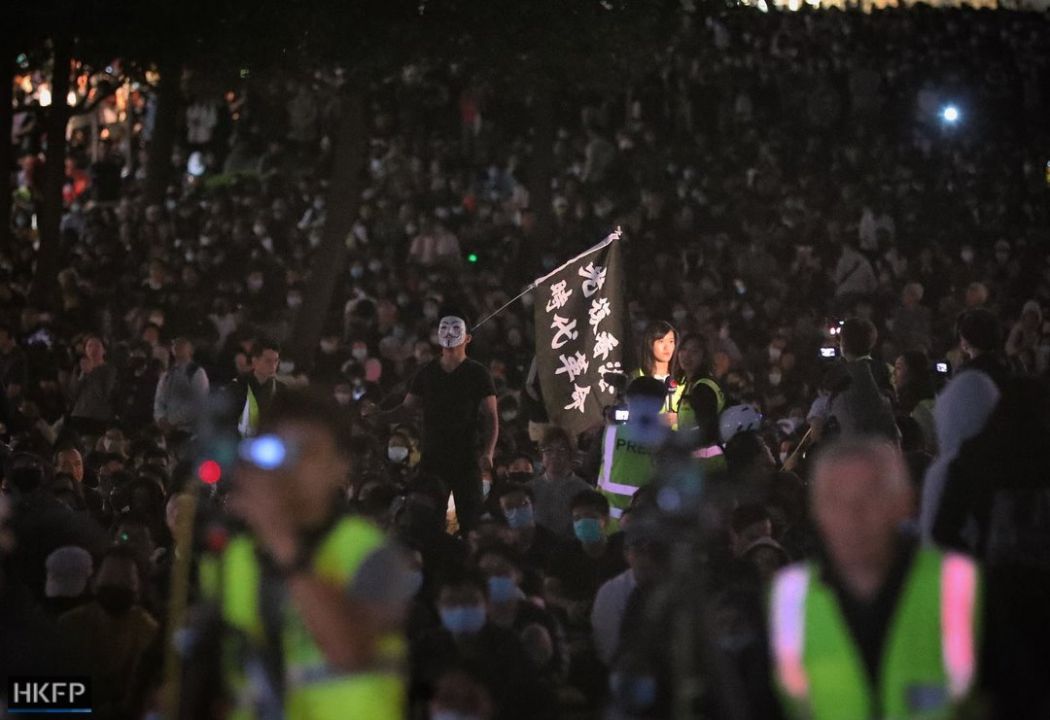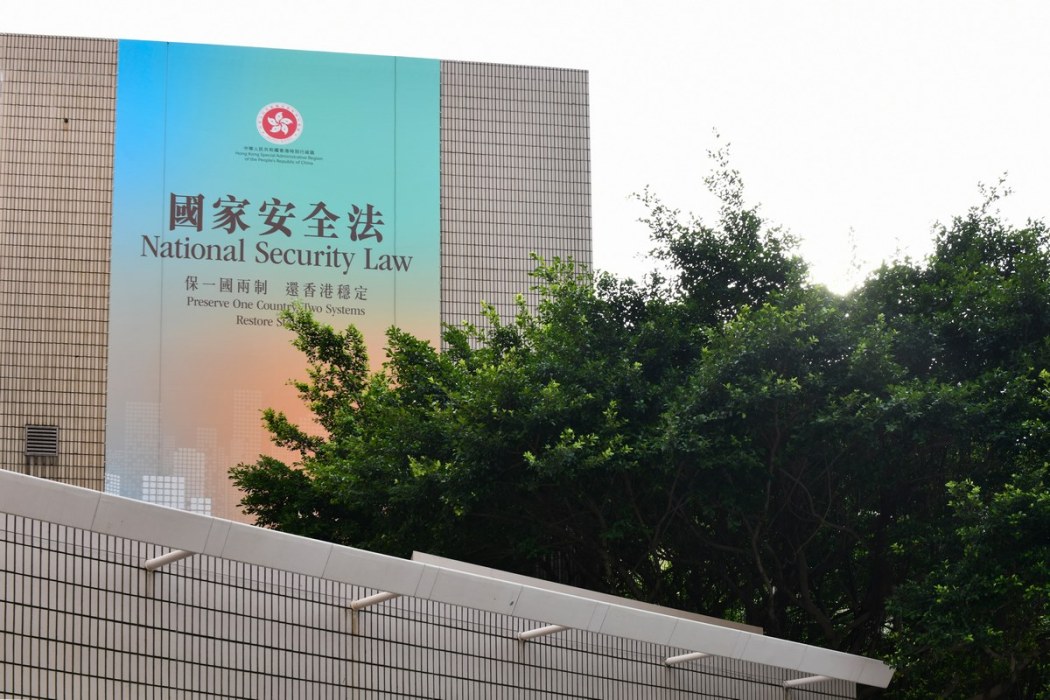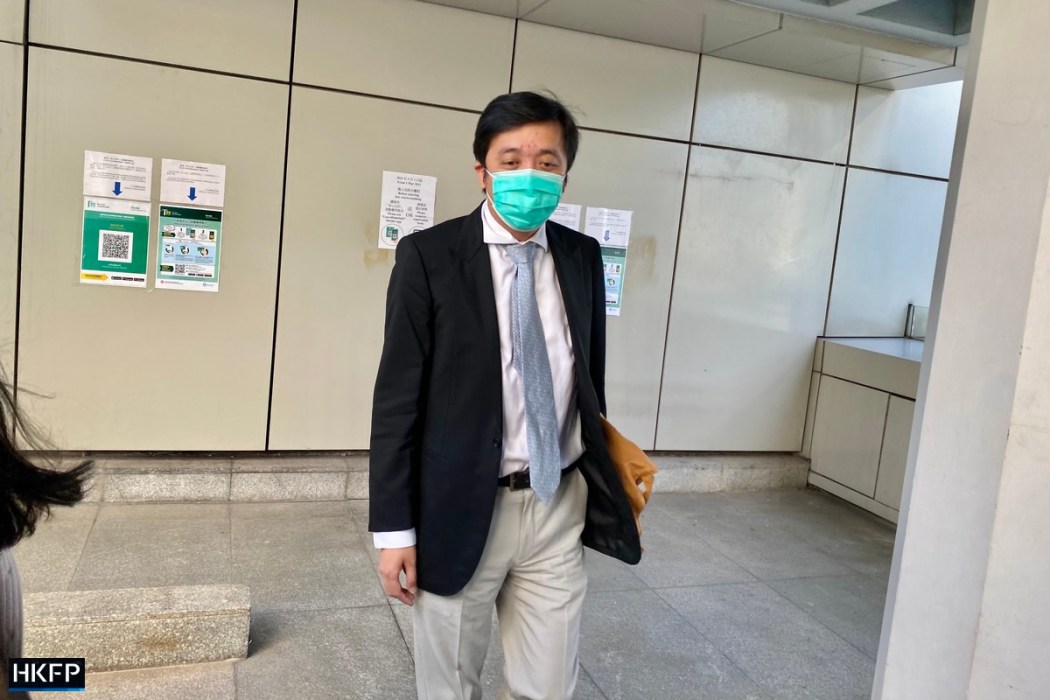The landmark verdict for Hong Kong’s first-ever national security law trial will be handed down next week, after the prosecution and the defence presented their closing arguments on Tuesday.
The high-profile trial of 24-year-old Tong Ying-kit, which lasted for 15 days, has now concluded at the High Court. A three-judge panel will next rule whether the activist is guilty of committing “incitement to secession” and “terrorist activities” under the Beijing-imposed national security law. The decision will likely form a legal reference for future cases under the controversial legislation.

Tong also stands accused of “causing grievous bodily harm by dangerous driving” as an alternative charge to the terrorism offence.
The activist became the first man to be arrested and prosecuted under the security law after he allegedly rammed a motorcycle displaying a “Liberate Hong Kong, revolution of our times” flag into three police officers during a protest last July 1.
The test case heard by Madam Justices Esther Toh and Anthea Pang and Justice Wilson Chan has centred around a debate on the meaning of the eight-word slogan. A day after Tong was arrested, the government said the slogan was banned as it had “pro-independence, secessionist and subversive” connotations.
Tong’s conduct
During the final trial day on Tuesday, lead prosecutor Anthony Chau submitted that Tong “deliberately” drove past four police check lines on the day and failed to stop his motorcycle despite repeated warnings. He said Tong “blatantly” breached the law and targeted police officers, with an “utter disregard for human life.”

The activist was said to have “intensified” his act of incitement by running past the police four times. The prosecution said Tong conducted a “parade” with a political agenda and communicated with people on the street who clapped and cheered when the activist drove past.
In relation to Tong’s terrorism charge, the acting deputy director of public prosecutions said the activist drove towards police officers at a close proximity on a motorcycle that had high horse power. The injury of three policemen showed the degree of violence, Chau said, adding that Tong “seriously jeopardised public safety.”
The prosecution suggested that Tong drove his motorcycle with a view to “coerce” the local or central government, or had intended to “intimidate” the public in order to pursue a political agenda. The protest slogan flag would have posed a “serious threat” to road safety as well, Chau said, should it have detached from Tong’s vehicle.
Justice Chan interjected and said Article 24 of the national security law stipulated that the elements of the offence should be linked to a list of acts, rather than a political agenda.

Under the sweeping legislation, terrorist activities are broadly defined to include serious violence against people, explosion and arson, sabotage of public transport facilities and interruption of public services control systems.
Chau responded by saying Tong’s “secessionist” acts provided a background on why he committed the terrorism offence, adding that – political agenda aside – Tong’s actions were targeted at the police.
The defence later countered by saying that Tong had “avoided running into police.” Senior Counsel Clive Grossman argued that, if Tong had intended to carry out acts of terror, he would have driven directly into a group of officers.
Grossman went on to say that Tong carried first aid items on the day to help any injured demonstrator, and such a move would contradict the character of a person who wanted to commit terrorism.
The senior counsel also suggested that Tong’s collision with the police was “not deliberate,” as the activist might have crashed into the officers after his arm was hit by a police shield.
‘Biased’ study
In summarising the meaning of the slogan in question, the prosecution said they would rely on the Lingnan University historian Lau Chi-pang’s interpretation. The scholar made reference to ancient Chinese texts and the 2016 election campaign of former localist leader Edward Leung to argue that the eight-word slogan was raised “necessarily for the objective of separating the HKSAR from the People’s Republic of China.”

Lead prosecutor Chau went on to cast doubt on the defence’s expert witnesses, politics professor Eliza Lee and journalism scholar Francis Lee, saying both had no expertise in Chinese Language or Chinese History.
Chau asked the court to attach no weight to the defence report jointly written by the two academics. He said the empirical data quoted – gathered by Francis Lee, the director of the Chinese University School of Journalism and Communication – would not help the court in understanding the meaning of the slogan. A focus group study conducted by the CUHK professor was also said to be “biased” and tainted with “leading questions.”
“[The LIHKG forum study] cannot provide any meaningful assistance to the court,” Chau said, referring to another study by Francis Lee which examined mentions of the phrase in question in comments and posts on the popular local discussion forum.
‘Rigid, mechanical’ views
Grossman defended their experts and said both were well-known in their respective fields. He said the fact that the research studies conducted by Francis Lee were not for the purpose of this case showed that the experts were “independent and impartial.”
He said that, unlike the historical analysis produced by Lau, the politics professor and journalism scholar focused on the contemporary use of the phrase in question, which they said did not necessarily convey secessionist ideas.

The senior counsel said “Liberate Hong Kong, revolution of our times” had many possible interpretations, and a protest slogan can be used not only to express demands, but also to express sentiments and solidarity.
The defence lawyer criticised Lau’s report, which placed an emphasis on the customary use of the phrase, as “untenable, rigid and mechanical,” saying the history professor paid no attention to rhetoric.
He also hit out at the prosecution’s scepticism that the defence expert study on the slogan was outdated. He said the analysis from historian Lau, who interpreted the slogan using Chinese texts from over 1,000 years ago, may be even more outdated.
“Professor Lau should be looking at the context of time,” Grossman said.
Responding to the use of the slogan by localist figure Leung, who advocated for Hong Kong independence, Grossman said it did not mean other people shared the same understanding of the “underlying meaning” of the phrase.

“Most importantly, does the defendant have the same view?” Grossman asked.
Capability to incite
Grossman referred to the prosecution’s submission that the Chinese text of the national security law had discrepancies with its English translation. He said it showed that written Chinese and English were often difficult to correlate.
The senior counsel argued that because the slogan at issue carried various meanings, the court should not rely on an “ordinary understanding” – as suggested by the prosecution – to interpret the subject meaning. The activist should be acquitted if the court found the slogan to have multiple meanings, he said.
Madam Justice Pang followed up by saying that the court would consider whether the “natural and reasonable effect” of the slogan was “capable” of inciting others to commit secession. They would also consider Tong’s criminal intent.
Grossman responded by saying the phrase was “too vague” to be capable of inciting others to commit secession, and any doubts over the effect of the slogan should benefit the defendant.
The case was adjourned to 3 pm on July 27, when the court will deliver a verdict.
Support HKFP | Policies & Ethics | Error/typo? | Contact Us | Newsletter | Transparency & Annual Report | Apps
Help safeguard press freedom & keep HKFP free for all readers by supporting our team
























